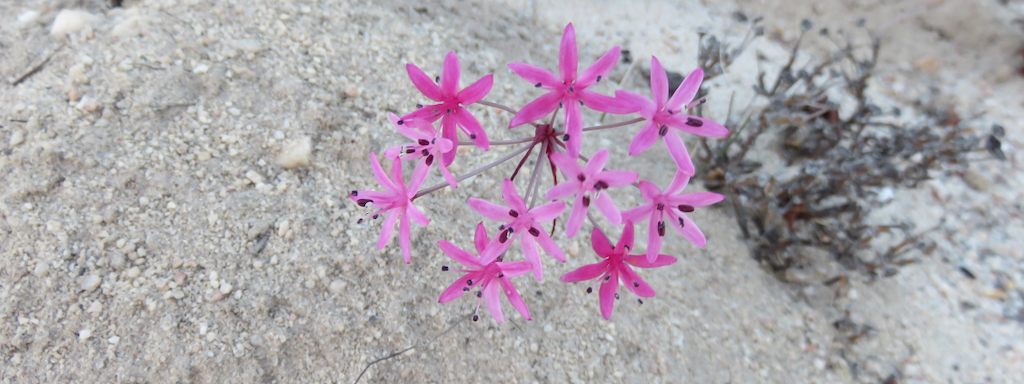
A desert flower blooms in South Africa © Ruth Bancewicz
Scientists bring a unique perspective to our study of the Bible. Their understanding of how living things work together, of mechanisms and processes, physical laws and current mysteries, informs their devotional reading. Can we learn to tap into this perspective in our church activities? Here, Professor Sarah Perrett, a biochemist, shares her sense of awe and gratitude at the ecosystems that are described in Psalm 104. Could we find similar ways to incorporate science into our worship on a Sunday, using words that everyone can engage with? Perhaps the scientists in your congregation could help!
1 Praise the Lord, my soul. Lord my God, you are very great; you are clothed with splendour and majesty…
10 He makes springs pour water into the ravines; it flows between the mountains.
11 They give water to all the beasts of the field; the wild donkeys quench their thirst.
12 The birds of the sky nest by the waters; they sing among the branches.
13 He waters the mountains from his upper chambers; the land is satisfied by the fruit of his work.
14 He makes grass grow for the cattle, and plants for people to cultivate – bringing forth food from the earth: 15 wine that gladdens human hearts, oil to make their faces shine, and bread that sustains their hearts.
16 The trees of the Lord are well watered, the cedars of Lebanon that he planted.
17 There the birds make their nests; the stork has its home in the junipers.
18 The high mountains belong to the wild goats; the crags are a refuge for the hyrax…
24 How many are your works, Lord! In wisdom you made them all; the earth is full of your creatures.
Psalm 104:1, 10–18, 24
This Psalm celebrates God’s creation and begins with a call to worship the Creator (v. 1). As a scientist, I study the world that God has created and my work is worship. If I separate my Christian faith and my secular work, then not only does the work become dry, but my soul does too. Isn’t this true for any of us, whether our work is ‘sacred’ or ‘secular’, whether outside the home or inside the home, whether we receive a salary or not?
God not only created the earth and all its living creatures, but he also made the earth produce all that is required to sustain his creation. Notice the emphasis on abundant water, which is essential for all the plants and animals to survive (vv. 10–13). From there comes the grass for cattle to eat and plants for people to cultivate for food (v. 14). We now know that it is the green plants that capture carbon dioxide from the air which produces not only food, but also the oxygen we breath. Cultivating the fruit of the earth provides purpose and pleasure for humankind (vv. 10–15). The well-watered trees provide a nesting place for birds and the mountain crags provide a home for animals (v. 16–18). God has provided the earth as a resource so that we and all his creatures can thrive. Do we treasure this? Do those of us who live in well-watered places show concern for those who are suffering the effects of man-made climate disaster?
As I study God’s works in the lab, I am humbled by the richness of his wisdom and feel awe at the vastness and variety of his creation (vv. 24–26). We are completely dependent on God, for the good things he gives us for practical day-to-day living (vv. 27–28) and for life (or death) itself (vv. 29–30). Do we acknowledge this in the way we live our lives? Do we separate sacred from secular and deprive ourselves from tapping into God’s treasure trove of wisdom? Or do we ask him to guide us in our daily decisions, knowing that he can see beyond the horizon?
This article was first published as part of a series of twelve devotions titled ‘Our Creator God’, which were written by staff and former staff of The Faraday Institute, in Guidelines: Bible study for Today’s Ministry and Mission, Sep-Dec 2022 (Bible Reading Fellowship), and is reproduced here by kind permission of the editors and author. A print copy of the issue containing this series can be ordered here.




